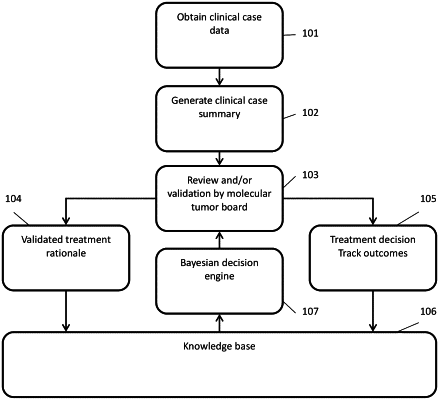|
1. A computing platform comprising one or more processors configured to provide: (a) a clinical case capture tool comprising: (i) a software module for presenting a plurality of selectable clinical case templates, each template comprising a plurality of adaptive clinical case parameters, each parameter comprising one or more selectable values; (ii) a software module for receiving user input pertaining to at least one template, parameter, and value to capture a clinical case of a patient; and (iii) a software module for generating a summary of a captured clinical case, the summary comprising at least one treatment rationale for the patient; (b) a clinician survey application comprising: (i) a software module for publishing the summary of the captured clinical case to an expert clinician network; (ii) a software module for collecting peer review feedback pertaining to a treatment rationale of the summary; and (iii) a software module for storing a plurality of peer reviewed treatment rationales to form a knowledge base; and (c) a clinical decision engine comprising: (i) a software module for receiving user input to identify a cohort and a treatment hypothesis; (ii) a software module for applying a machine learning algorithm utilizing the knowledge base to provide one or more ranked treatment protocols based on predicted outcomes, wherein the software module conducts a Bayesian decision process to prioritize the one or more ranked treatment protocols in order to coordinate treatment decisions across a plurality of patients, wherein the Bayesian decision process prioritizes the one or more ranked treatment protocols based at least in part on (1) an efficacy of the one or more ranked treatment protocols, and (2) a variance or uncertainty of an efficacy of a n equipoise set of the one or more ranked treatment protocols, and wherein the Bayesian decision process prioritizes the equipoise set based at least in part on relative amount of information gained from the predicted outcomes across the equipoise set; and (iii) a software module for providing a registry for collecting outcome data of the captured clinical case to update the knowledge base, wherein the machine learning algorithm is trained using the updated knowledge base comprising a training data set comprising a plurality of input features and the outcome data of the captured clinical case.
|
